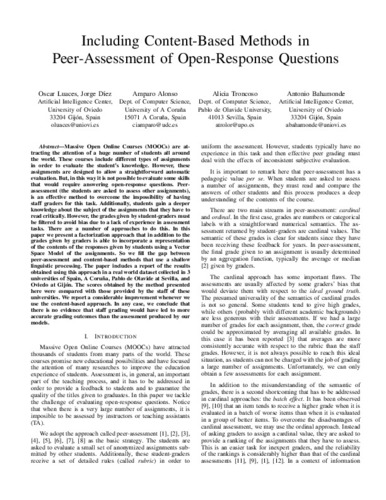Including Content-Based Methods in Peer-Assessment of Open-Response Questions
Autor(es) y otros:
Fecha de publicación:
Editorial:
IEEE
Versión del editor:
Descripción física:
Resumen:
Massive Open Online Courses (MOOCs) are attracting the attention of a huge number of students all around the world. These courses include different types of assignments in order to evaluate the student’s knowledge. However, these assignments are designed to allow a straightforward automatic evaluation. But, in this way it is not possible to evaluate some skills that would require answering open-response questions. Peerassessment (the students are asked to assess other assignments), is an effective method to overcome the impossibility of having staff graders for this task. Additionally, students gain a deeper knowledge about the subject of the assignments that they have to read critically. However, the grades given by student-graders must be filtered to avoid bias due to a lack of experience in assessment tasks. There are a number of approaches to do this. In this paper we present a factorization approach that in addition to the grades given by graders is able to incorporate a representation of the contents of the responses given by students using a Vector Space Model of the assignments. So we fill the gap between peer-assessment and content-based methods that use a shallow linguistic processing. The paper includes a report of the results obtained using this approach in a real world dataset collected in 3 universities of Spain, A Coru˜ na, Pablo de Olavide at Sevilla, and Oviedo at Gij´on. The scores obtained by the method presented here were compared with those provided by the staff of these universities. We report a considerable improvement whenever we use the content-based approach. In any case, we conclude that there is no evidence that staff grading would have led to more accurate grading outcomes than the assessment produced by our models
Massive Open Online Courses (MOOCs) are attracting the attention of a huge number of students all around the world. These courses include different types of assignments in order to evaluate the student’s knowledge. However, these assignments are designed to allow a straightforward automatic evaluation. But, in this way it is not possible to evaluate some skills that would require answering open-response questions. Peerassessment (the students are asked to assess other assignments), is an effective method to overcome the impossibility of having staff graders for this task. Additionally, students gain a deeper knowledge about the subject of the assignments that they have to read critically. However, the grades given by student-graders must be filtered to avoid bias due to a lack of experience in assessment tasks. There are a number of approaches to do this. In this paper we present a factorization approach that in addition to the grades given by graders is able to incorporate a representation of the contents of the responses given by students using a Vector Space Model of the assignments. So we fill the gap between peer-assessment and content-based methods that use a shallow linguistic processing. The paper includes a report of the results obtained using this approach in a real world dataset collected in 3 universities of Spain, A Coru˜ na, Pablo de Olavide at Sevilla, and Oviedo at Gij´on. The scores obtained by the method presented here were compared with those provided by the staff of these universities. We report a considerable improvement whenever we use the content-based approach. In any case, we conclude that there is no evidence that staff grading would have led to more accurate grading outcomes than the assessment produced by our models
Descripción:
Workshop on Data Mining for Educational Assessment and Feedback (ASSESS 2015)
ISBN:
Patrocinado por:
The research reported here is supported in part under grants TIN2011- 23558, TIN2012-37954 and TIN2011-28956-C02 from the MINECO (Ministerio de Economía y Competitividad, Spain), all partially supported with FEDER funds. We would also like to thank our students for grading the assignments of other colleagues in the Universities of A Coruña, Pablo de Olavide, and Oviedo
Colecciones
- Capítulos de libros [6356]
- Informática [813]
- Investigaciones y Documentos OpenAIRE [8112]
Ficheros en el ítem




